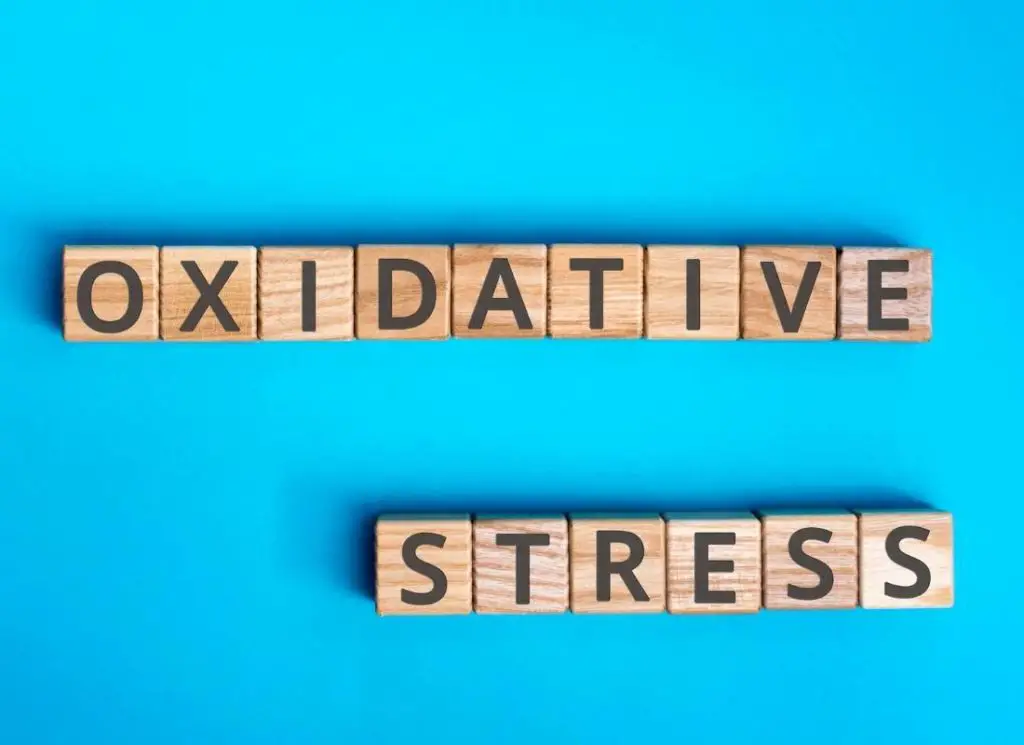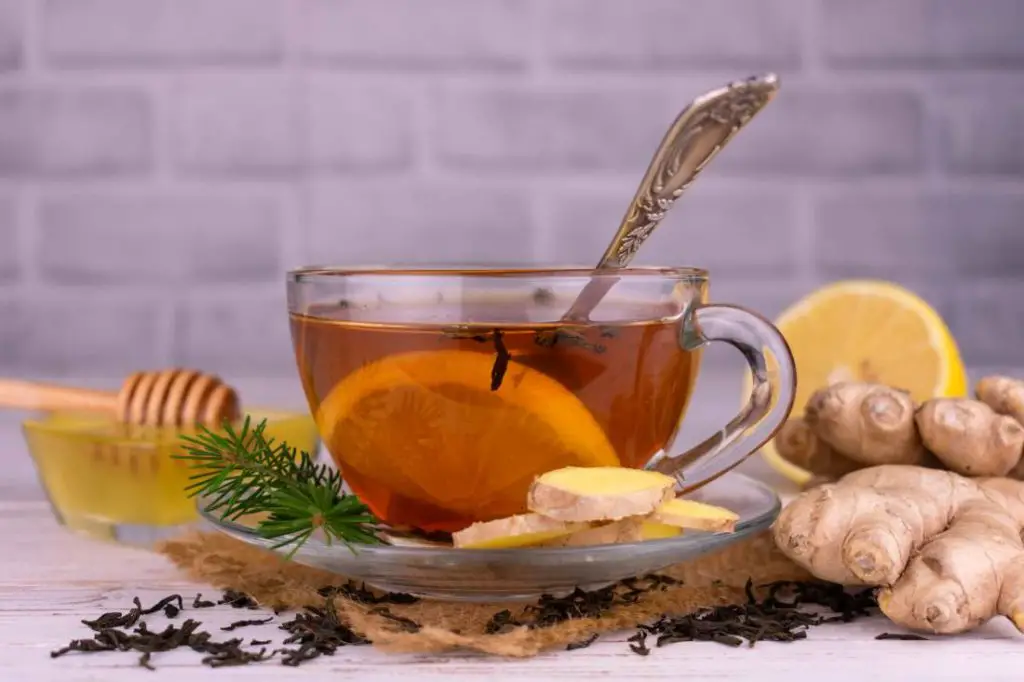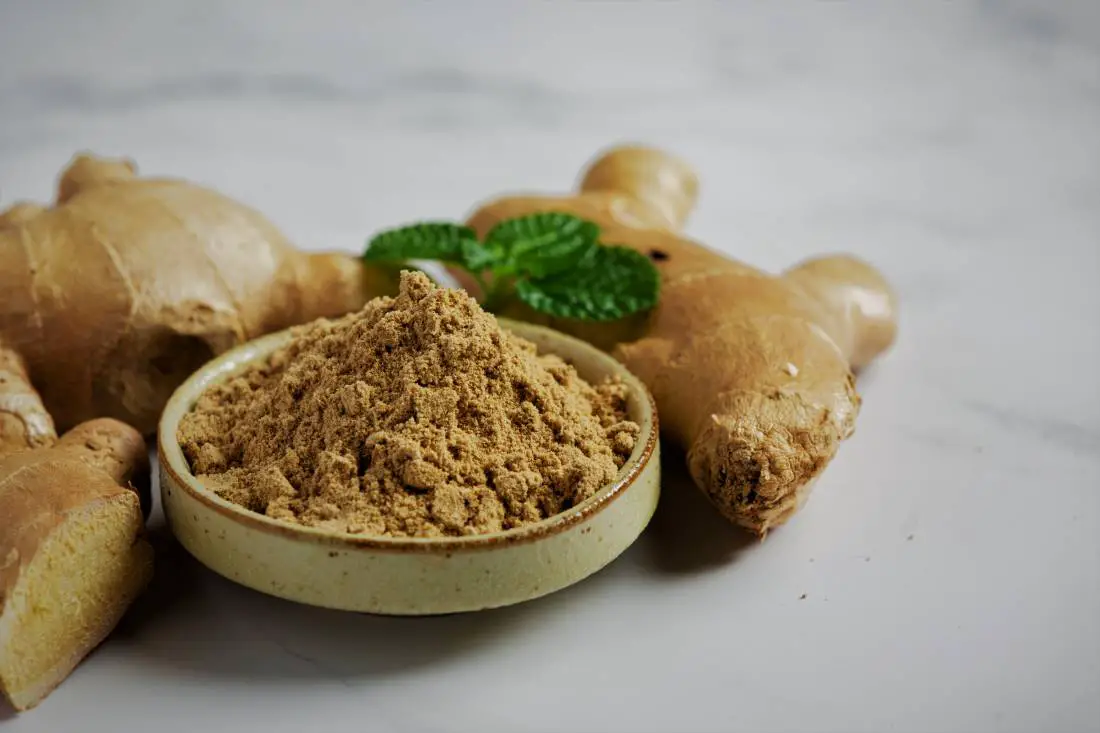Ginger is a root vegetable with a pungent flavor and aroma that is also warm and satisfying. Whether you buy it fresh, pureed, or powdered, it brings out the flavor of foods in a way that few spices can. But if you have histamine intolerance, you have to be aware of how each food you eat affects histamine intolerance symptoms.
Throughout time, people have used ginger not only for flavor but also medicinally to ease the symptoms of nausea and reduce inflammation. Ginger’s warm and spicy taste comes from a phytochemical called gingerol, but also contains other phytochemicals, including zingerone, shogaols, and paradols. These compounds may explain the health benefits of ginger.
Ginger and Histamine: Is Ginger High Histamine?
Is ginger high histamine? Ginger is not high in histamine, making it a safe vegetable if you have histamine intolerance. It also doesn’t act as a histamine liberator. Research shows ginger has both antioxidant and anti-inflammatory activity (1), which may be beneficial if you have histamine intolerance.
You may already know what an antioxidant is and how it functions. The activities inside cells produce rogue molecules called free radicals. Because these molecules are missing an electron, they greedily search for one to make themselves whole again.
When a free radical grabs an electron, it damages another cell and sets off a train of events called oxidative stress that can cause damage on a larger scale. When you breathe in polluted air, expose your skin to sunlight, or eat junk food, it also creates more free radicals. If you have more antioxidants in your system, they help stop oxidative stress and prevent cell damage.
Scientists believe gingerols in ginger explain most of the antioxidant benefits of ginger.

The Anti-Inflammatory Effects of Ginger
If you have histamine intolerance, you also want to consume a diet with anti-inflammatory properties. Research shows (1) ginger has anti-inflammatory effects through various pathways. It blocks the activity of inflammatory chemicals called cytokines that trigger inflammation. These include inflammatory cytokines like TNF-alpha, IL-1, and also reduce the expression of genes that produce inflammatory chemicals, including NF-KB and COX-2. (2)
Reducing inflammation is important if you have histamine intolerance, but also for health, since most health problems have an inflammatory component. Because of its anti-inflammatory effect, studies show ginger may improve pain and reduce disability in people with osteoarthritis. (4)
Is Ginger a Mast Cell Stabilizer?
Some research shows ginger reduces cytokines that activate mast cells, histamine-producing cells, and may be beneficial for allergic rhinitis. (3) Ginger has shown promise in animal studies by suppressing the production of certain cytokines that trigger mast cell activation, ultimately preventing and alleviating allergic rhinitis symptoms. So, ginger may be a mast cell stabilizer.
While human studies are still emerging, adding ginger to your diet is relatively easy and may contribute to reducing allergy-related inflammation.These findings suggest that components in ginger may be beneficial if you have histamine intolerance. Not only is ginger not a high-histamine food, but it may also have other benefits that make it an excellent addition to your diet if you suffer from histamine sensitivity symptoms and seasonal allergies.
Ginger is also a good alternative for adding flavor to foods, as certain spices are high in histamine.
Ginger as a Natural Antihistamine
One interesting study found that ginger was as effective as the antihistamine Loratidine for reducing nasal symptoms of allergic rhinitis. (6) During allergy season, millions of people get stuffy noses, sneezing, and watery eyes from seasonal allergies.
Many of the symptoms of allergic rhinitis are caused by the release of histamine. At lesat in this study, ginger helped reduce the burden of nasal symptoms from seasonal allergies. Plus, people who used ginger rather than Loratidine experienced fewer side effects of drowsiness, dizziness, and fatigue. (6)
Is Ginger Safe if You Have Histamine Intolerance?
As discussed, ginger is not only safe, but may be of benefit for histamine intolerance and inflammatory conditions, such as osteoarthritis. That’s an area that needs more research. Some people get ginger from a ginger supplement containing ginger extract.
Although ginger is safe in reasonable quantities, it can cause side effects. Some side effects people experience when they consume ginger supplements are large quantities of ginger (over 5 grams per day) include:
- Worsening of acid reflux symptoms
- Heartburn
- Flatulence
- Diarrhea
- Generalized tummy discomfort
In the osteoarthritis studies, a number of people dropped out because they didn’t like the taste or experienced stomach discomfort while on ginger.
Always talk to your doctor before taking supplements, even natural ones, like ginger. Many supplements interact with medications, especially blood thinners. Ginger is no exception, as it slows blood clotting.
If you’re taking another medication that slows blood clotting, like warfarin, heparin, clopidogrel, aspirin, enoxaparin, datelparin, or a non-steroidal anti-inflammatory medication, including ibuprofen, you wouldn’t want to take a ginger supplement. (5) Doing so would slow down how quickly your blood clots even more and would increase your risk of bleeding.
Some medications used to treat high blood pressure and medications used to lower blood sugar may interact with a ginger supplement too. (5) So, don’t try a ginger supplement without talking to your physician first.

Enjoy Ginger in Its Food Form
I wouldn’t recommend taking ginger as a supplement, but instead add whole food ginger to your diet. There are lots of ways to enjoy the anti-inflammatory and antioxidant benefits of ginger if you have histamine intolerance.
The form of ginger – whole, pureed, or ginger juice – shouldn’t have a substantial impact on whether you get the health benefits. Raw ginger has a more powerful taste and aroma than dried ginger, but you can get benefits from both.
What are some ways to use ginger? Grate dried or raw ginger into soups, stews, or stir-fries. You can also add grated ginger to smoothies. You can also buy small glass bottles of pureed ginger in some supermarkets but make sure they don’t add anything else to the container that might trigger histamine intolerance symptoms.
Another option is to drink a few cups of ginger tea every day. Here’s how to make ginger tea:
- Boil one cup of water
- Add 2 slices of fresh ginger root.
- Let the ginger steep for 7 minutes.
- Sip and enjoy!
Is Ginger Powder High Histamine?
If you prefer the convenience of ginger powder, you might wonder whether it’s high in histamine? Although processing can sometimes alter the histamine content of certain foods, there’s no evidence that ginger powder is high in histamine or stimulates histamine release from mast cells.
However, powdered ginger may contain slightly less gingerol, an active ingredient in ginger that gives it its anti-inflammatory properties. (7) Yet, research shows it may also contain more shogaols, another compound with anti-inflammatory activity. (7) So, fresh or powdered ginger is low histamine and has anti-inflammatory benefits.
Keep a Histamine Intolerance Food Diary
Any time you make changes to your diet with histamine intolerance, you’ll need to track your response carefully. When you add new food, such as ginger, do it in small amounts at first and monitor your symptoms. Consider any new histamine intolerance symptoms in the context of your diet as a whole.
If you added another food simultaneously with ginger, could that food be responsible for new symptoms? A histamine intolerance diet journal will help you decipher how dietary changes affect your symptoms. You should find that adding ginger to your plate improves rather than worsens your histamine sensitivity symptoms.
Is Ginger High Histamine?
No, ginger is not a high-histamine food. It has anti-inflammatory activity that may be beneficial if you have histamine intolerance or seasonal allergies. If you enjoy the taste of ginger, so much the better. In summary:
- Get ginger in food form, not a supplement.
- Make sure you’re not taking medications that ginger interacts with, especially if you take a supplement
- Choose the form of ginger you like best. Dried and fresh are both fine.
- Keep a histamine intolerance food diary to see how your body responds.
References:
- Mashhadi NS, Ghiasvand R, Askari G, Hariri M, Darvishi L, Mofid MR. Anti-oxidative and anti-inflammatory effects of ginger in health and physical activity: review of current evidence. Int J Prev Med. 2013 Apr;4(Suppl 1):S36-42. PMID: 23717767; PMCID: PMC3665023. https://www.ncbi.nlm.nih.gov/labs/pmc/articles/PMC3665023/
- Tjendraputra E, Tran VH, Liu-Brennan D, Roufogalis BD, Duke CC. Effect of ginger constituents and synthetic analogues on cyclooxygenase-2 enzyme in intact cells. Bioorg Chem. 2001 Jun;29(3):156-63. doi: 10.1006/bioo.2001.1208. PMID: 11437391. https://pubmed.ncbi.nlm.nih.gov/11437391/
- The Journal of Nutritional Biochemistry. Volume 27, January 2016, Pages 112-122.
- Bartels EM, Folmer VN, Bliddal H, Altman RD, Juhl C, Tarp S, Zhang W, Christensen R. Efficacy and safety of ginger in osteoarthritis patients: a meta-analysis of randomized placebo-controlled trials. Osteoarthritis Cartilage. 2015 Jan;23(1):13-21. doi: 10.1016/j.joca.2014.09.024. Epub 2014 Oct 7. PMID: 25300574. https://pubmed.ncbi.nlm.nih.gov/25300574/
- “GINGER: Overview, Uses, Side Effects, Precautions ….” https://www.webmd.com/vitamins/ai/ingredientmono-961/ginger.
- Yamprasert R, Chanvimalueng W, Mukkasombut N, Itharat A. Ginger extract versus Loratadine in the treatment of allergic rhinitis: a randomized controlled trial. BMC Complement Med Ther. 2020 Apr 20;20(1):119. doi: 10.1186/s12906-020-2875-z. PMID: 32312261; PMCID: PMC7171779.
- Mao QQ, Xu XY, Cao SY, Gan RY, Corke H, Beta T, Li HB. Bioactive Compounds and Bioactivities of Ginger (Zingiber officinale Roscoe). Foods. 2019 May 30;8(6):185. doi: 10.3390/foods8060185. PMID: 31151279; PMCID: PMC6616534.

